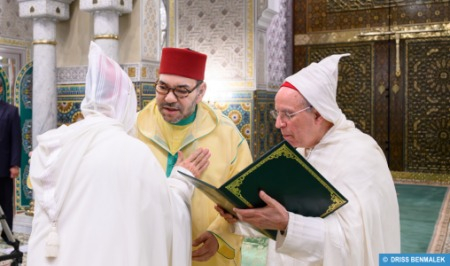
“The proposition of responsibility between the pact of original nature and the plenitude of Legislation”, theme of Ramadan third religious lecture
King Mohammed VI, Commander of the Faithful, accompanied by Prince Moulay Rachid and Prince Moulay Ismail, chaired, on Saturday at the Royal Palace in Casablanca, the third religious lecture of the holy month of Ramadan 1445 AH.
The lecture was given by Moustapha Al Bahyaoui, Chair Professor of Exegesis (Tafssir), under the theme “The proposition of responsibility between the pact of original nature and the plenitude of Legislation.”
Pr Al Bahyaoui focused his lecture on the meanings of the verse of responsibility (Amanah): “Truly, We did offer the Amanah to the heavens and the earth, and the mountains, but they declined to bear it and were afraid of it. But man bore it. Verily, he was unjust and ignorant” (Sourate Al Ahzab).
This verse offers information on truths related to the distant origins of religion and its oneness to draw attention to two distinctive features of Man which have prevented him from assuming this responsibility, namely his innate injustice and profound ignorance, the lecturer explained, citing other verses dealing with responsibility.
Pr Al Bahyaoui pointed out that the verse from Sourate Al Ahzab carries within it several meanings linked particularly to the ancient nature of this proposition, the authenticity of Istikhlaf, and the greatness of the mission incumbent on Man.
He noted that the message deduced from this verse is that responsibility has been placed in the hearts of people in the same way as faith, and is thus an innate propensity in Man, by virtue of which he was a religious by nature.
Man leans by nature towards oneness rather than multiplicity, towards justice instead of injustice, towards rectitude instead of extremism and deviation, and towards order instead of anarchy and futility, he said.
The lecturer stressed that “this root, like any root cultivated in the visible world”, must be preserved and maintained, otherwise it will remain neglected and subject to external influences which may alter it.
The lecturer who pointed out that Man is able to embrace values and good virtues, being virtuous by nature, said that it is up to human beings to perceive the universe around them as a clear illustration of the existence of God. Man is therefore required to constantly bear in mind the heavy responsibility he bears by showing fear of God and abandoning the path of selfishness and excess, he explained.
From this perspective, Man is invited to honor the responsibility he has toward God, a divine prescription which the universes could not fulfill, he said, noting that the Almighty surrounds the human being with His assistance and mercy in fulfilling his duties towards Him and towards His creatures.
At the end of the lecture, the King, Commander of the Faithful, was greeted by Sheikh Muhammad Ahmad Muhammad Hussein, Grand Mufti of Al Quds and Palestine; Ismail Lutfi Japakiya, Rector of Fatoni University (Thailand); Rafaâ Ben Achour, Professor at the University of Carthage (Tunisia) and Judge at the African Court of Human Rights; Abdallah Al Machri, Mauritanian scholar; and Yugo Aboubacar, President of Burkina Faso’s section of the Mohammed VI Foundation of African Ulemas.
The Sovereign was also greeted by Daoud Denis Grill, Research Professor at the Institute for Research and Studies on the Arab and Muslim World (France); Mustapha Diatra, Advisor to the Caliph General of the Mourides (Senegal); Abdelkarim Dioubate, President of the Guinean section of the Mohammed VI Foundation of African Ulemas; Sheikh Ibrahim Nasser Niass, Secretary General of the African Islamic Union; Sheikh Alami Abdellah Aater, President of Djibouti’s section of the Mohammed VI Foundation of African Ulemas; and Ahmed Said Ould Bah, President of the Modern University of Chinguitt (Mauritania).
Minister of Endowments and Islamic Affairs, Ahmed Toufiq, then presented to the Sovereign an electronic medium featuring a collective reading of the Holy Quran (60 Hizbs), in audio and video formats, by the Mourchidates of the Rabat-based Mohammed VI Institute for the Training of Imams, Mourchidines and Mourchidates.
